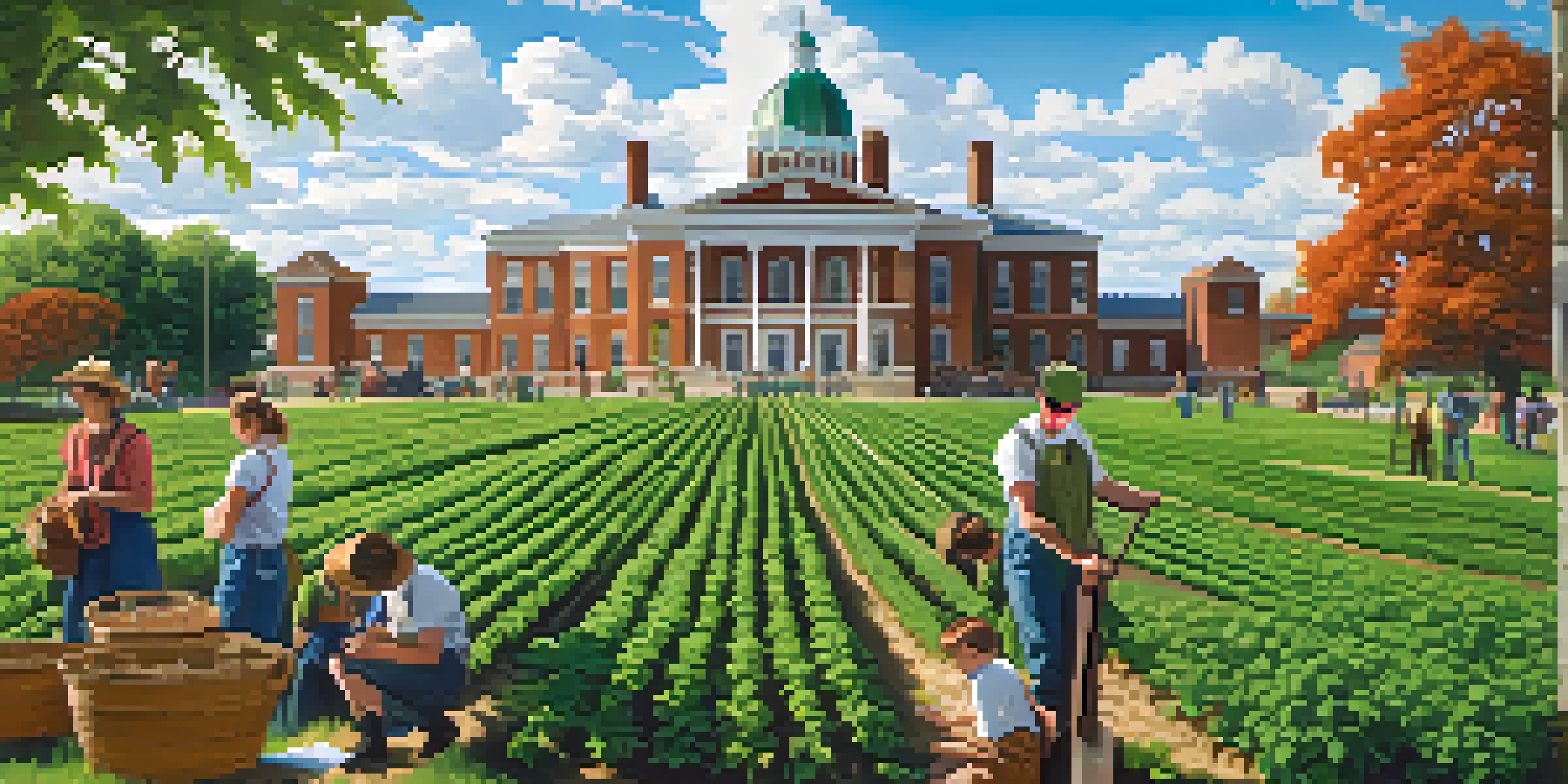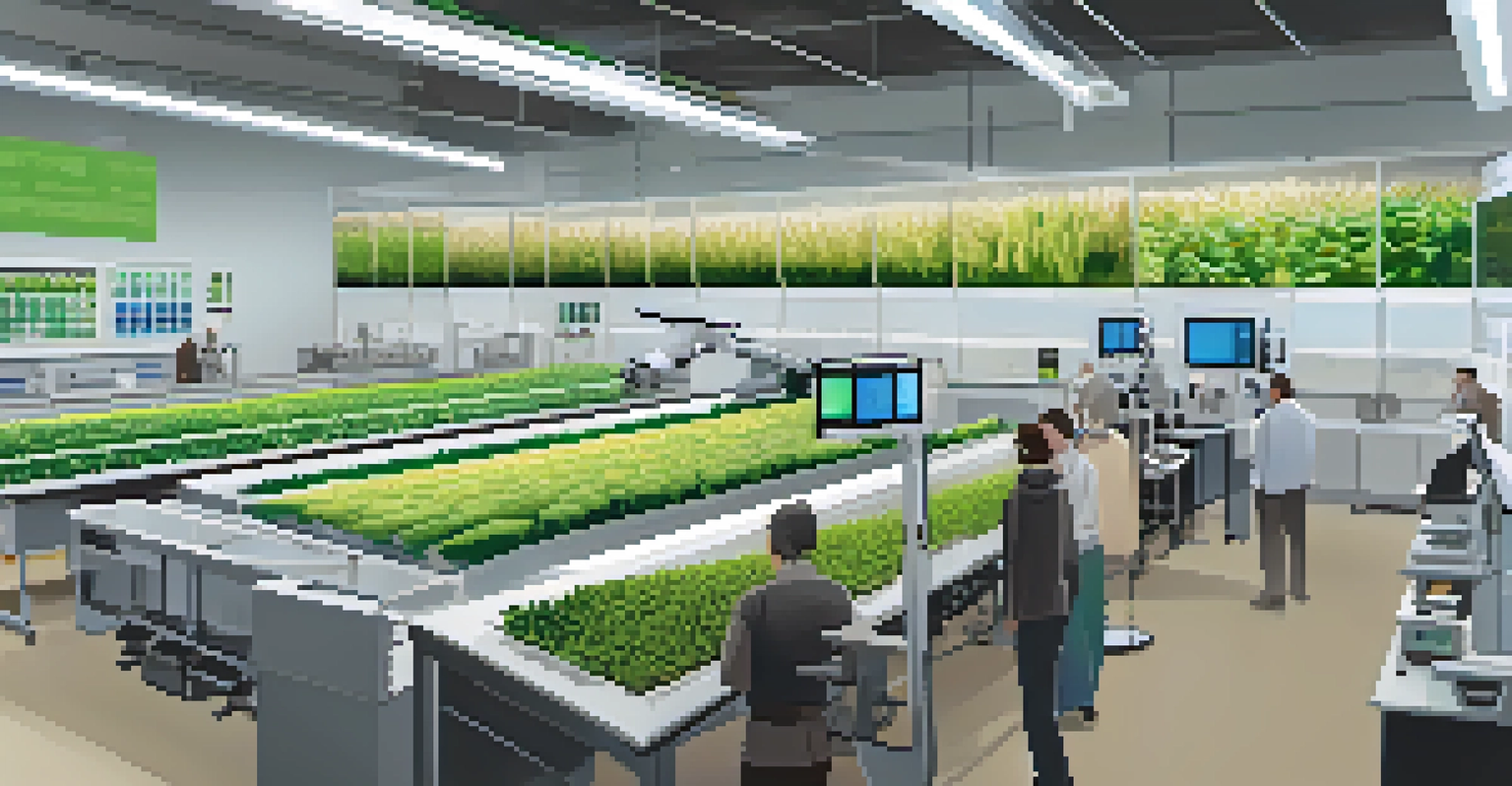Michigan State University's Role in Agricultural Studies

A Historical Overview of MSU's Agricultural Programs
Michigan State University (MSU) has a rich history in agricultural education, dating back to its founding in 1855 as the nation's first agricultural college. This pioneering spirit laid the groundwork for a robust academic framework that emphasizes both practical and theoretical aspects of agriculture. Over the years, MSU's programs have evolved to meet the changing needs of the agricultural sector, reflecting advancements in technology and scientific research.
Agriculture is our wisest pursuit, because it will in the end contribute most to real wealth, good morals, and happiness.
The establishment of the College of Agriculture and Natural Resources at MSU in 1885 marked a significant milestone in agricultural studies. This college has cultivated generations of leaders who have contributed to innovations in farming, sustainability, and food systems. Furthermore, MSU's early adoption of research initiatives has made it a hub for groundbreaking agricultural studies, setting a precedent that many institutions would follow.
Today, MSU continues to honor its legacy by integrating cutting-edge research with education. The emphasis on hands-on learning through fieldwork and internships prepares students for real-world challenges. This blend of history and modernity positions MSU at the forefront of agricultural education.
Innovative Research at MSU in Agriculture
Michigan State University is renowned for its innovative research initiatives in agriculture, addressing critical issues such as food security, sustainable farming, and climate change. With dedicated research centers like the W.K. Kellogg Biological Station and the MSU AgBioResearch, faculty and students collaborate to find solutions that benefit both farmers and consumers. This focus on real-world applications ensures that research translates into actionable strategies.

One notable example is the research on precision agriculture, which uses technology to enhance crop yields while minimizing environmental impact. By analyzing data from various sources, researchers at MSU develop methods that allow farmers to make informed decisions, ultimately leading to more efficient and sustainable practices. This kind of research not only bolsters local economies but also contributes to global food systems.
Legacy of Agricultural Education
Michigan State University has a pioneering history in agricultural education, being the first agricultural college in the U.S. established in 1855.
Furthermore, MSU's commitment to interdisciplinary research fosters collaboration across departments, leading to innovative approaches in agricultural studies. By bridging gaps between fields such as environmental science, economics, and technology, MSU cultivates a dynamic environment that encourages fresh ideas and solutions to complex agricultural challenges.
Hands-On Learning Opportunities for Students
At Michigan State University, students benefit from a wealth of hands-on learning opportunities that enhance their educational experience in agriculture. The university's farms and research stations serve as living laboratories where students can apply theoretical knowledge in real-world settings. This practical approach not only deepens understanding but also builds essential skills needed in the agricultural workforce.
The farmer is the one who feeds us all.
Internships and cooperative education programs are critical components of MSU's agricultural curriculum, allowing students to gain valuable experience while working alongside industry professionals. These experiences often lead to job placements after graduation, as students establish networks and gain insights into the agricultural sector. Understanding the nuances of the industry firsthand prepares them for successful careers.
Moreover, student organizations and clubs, such as the Agriculture and Natural Resources Student Council, provide additional avenues for involvement. These groups foster leadership skills and encourage collaboration among students with diverse interests and backgrounds, enriching their overall educational journey.
Collaborations with Local Farmers and Organizations
Michigan State University maintains strong partnerships with local farmers and agricultural organizations, creating a vibrant ecosystem for research and education. These collaborations allow MSU to stay attuned to the needs and challenges faced by the agricultural community, ensuring that research priorities align with real-world demands. By working closely with local stakeholders, MSU enhances its relevance and impact.
One initiative, the MSU Extension, serves as a bridge between the university and the agricultural community, providing resources, training, and expertise to farmers across Michigan. Through workshops and outreach programs, MSU Extension promotes best practices and innovative techniques, helping farmers improve productivity and sustainability. This hands-on support strengthens the bond between academia and agriculture.
Innovative Research Initiatives
MSU is at the forefront of agricultural research, tackling critical issues like food security and sustainable farming through advanced technology and interdisciplinary collaboration.
Additionally, partnerships with organizations like the Michigan Farm Bureau enable students and faculty to engage directly with industry trends and challenges. These alliances not only enrich the educational experience but also contribute to the advancement of sustainable agricultural practices in the region.
Focus on Sustainability in Agricultural Studies
Sustainability is a core principle of agricultural studies at Michigan State University, reflecting a growing awareness of environmental issues and resource management. MSU emphasizes sustainable farming practices through its research, education, and outreach initiatives, aiming to reduce the ecological footprint of agriculture while ensuring food security. This commitment to sustainability shapes the curriculum and research focus across various programs.
Students are encouraged to explore sustainable agriculture through hands-on projects, such as organic farming and agroecology. These experiences not only equip them with practical skills but also instill a sense of responsibility toward the environment. By emphasizing a holistic approach to agriculture, MSU prepares future leaders to tackle pressing environmental challenges.
Moreover, MSU's involvement in global sustainability initiatives showcases its dedication to fostering a sustainable future. Collaborative projects with international partners address issues like climate resilience and resource conservation, highlighting MSU's role in the global agricultural landscape. This focus on sustainability not only benefits local communities but also contributes to global efforts for a healthier planet.
Impact of Agricultural Studies on the Community
The impact of agricultural studies at Michigan State University extends far beyond the campus, positively influencing local communities and the agricultural sector at large. Through research and outreach programs, MSU actively supports farmers, enhancing their productivity and profitability. This engagement fosters economic growth and stability in the region, creating a ripple effect that benefits everyone involved.
Community engagement initiatives, such as farmers' markets and educational workshops, empower local producers and consumers alike. By facilitating connections between farmers and consumers, MSU promotes local food systems and sustainable practices. These initiatives not only support local economies but also encourage healthier eating habits and greater awareness of agricultural issues.
Hands-On Learning Opportunities
Students at MSU benefit from practical experiences in agriculture through internships, cooperative education, and involvement in student organizations.
Furthermore, MSU's commitment to diversity and inclusion in agricultural studies ensures that all voices are heard, enriching the agricultural community as a whole. By promoting equitable access to resources and education, MSU helps create a more resilient and vibrant agricultural landscape that benefits everyone.
Future Directions for Agricultural Studies at MSU
As Michigan State University looks to the future, it is poised to continue leading the way in agricultural studies through innovation and adaptability. The ever-evolving challenges in agriculture, such as climate change and technological advancements, require a forward-thinking approach. MSU is dedicated to staying at the forefront of these changes by investing in research and curriculum development that addresses emerging trends.
The integration of technology into agricultural practices is a key focus for MSU, with initiatives aimed at incorporating data analytics, artificial intelligence, and biotechnology into the curriculum. By equipping students with the skills needed to navigate a tech-driven agricultural landscape, MSU prepares them for successful careers in an increasingly competitive job market. This emphasis on technology fosters a culture of innovation that is crucial for the future of agriculture.

Moreover, MSU's commitment to global engagement will continue to enhance its agricultural studies programs. By collaborating with international partners and addressing global challenges, MSU aims to prepare students to think critically and act responsibly on a global scale. The future of agricultural studies at MSU looks bright, with endless possibilities for growth and impact.